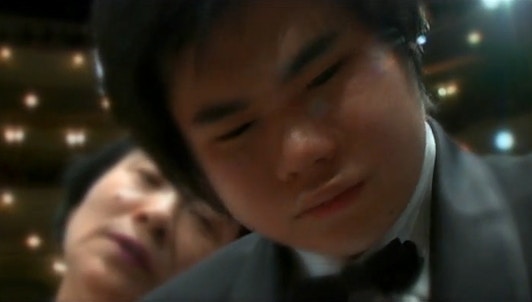Cliburn in Chopin and Arrau in Beethoven: illuminating contrasts in both creator and re-creator, in composer and performer.
Cliburn was recorded by the BBC one year after his tumultuous triumph in the 1958 inaugural Tchaikovsky Competition, where his playing captivated a jury that included such luminaries as Shostakovich, Kabalevsky, Richter and Gilels. For Richter, Cliburn was the genuine article ("he is a pianist, the others are not"), and oblivious to competition etiquette, he awarded Cliburn one hundred marks, the others zero. The Tchaikovsky Competition had been created as a showcase for Russian talent and so Cliburn's hold on both his jury and audience came as a shock. Here, after all, was an American pianist who made his admirers forget the current cold was and who defied cynical expectations of a crew-cut school of playing expressed in un-lyrical, cut-glass sound. Later in London, Cliburn would attract a capacity audience (including several Hollywood stars) to the Royal Festival Hall and launched an international career that quickly took its toll.
On the present programme, Cliburn has a relaxed mastery that is worlds away from the steeliness and hypertension associated with many of his compatriots. Even the Minor-key dramas of the Third Scherzo and F Minor Fantasy are contained rather than fiercely ignited. Nothing is rushed and everything is in place, a quality natbly true of his way with the Third Ballade. Cliburn, clearly on best behavious for the BBC comments that for him the Fantasy shows a struggle between earthly passions and spiritual awakening.
Claudio Arrau's Beethoven dates from the same period. Arrau has been described as "Prince," "Emperor" and "King" of the keyboard, and such royal denominators convey something of the awe which he was held. In Arrau's performance, there is little of Cliburn's relatively laissez-faire approach; instead there is a burning intensity that holds and indeed rivets the attention. At the same time there is none of that sometimes overbearing and pedantic quality that afflicted Arrau during his later years. There is above all, in the elemental outpouring of the Appassionata Sonata, a richness and humanity, something never divorced from other vital forms of expression. Not surprisingly, Arrau possessed a formidable knowledge of a wide variety of subjects, most notably of philosophy, art and literature.
Bryce Morrison

